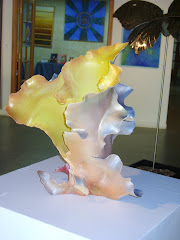I sent this as a repy to someone who asked what I beleive in as a religion. I am open to any comments or criticsms from anyone who was an associate of Dr. Mills, or anyone who experiential knows the meaning of "Advaita" or "Non-dualism."
"Thanks for your interest. What you might term a religion, I might term a "Standpoint." Though I am not a Christian Scientist, the founder of that faith put it rather well: "The Universe must be interpreted from the Standpoint of the Creator of the Universe.." She also said "God is universal; confined to no spot, defined by no dogma, appropriated by no sect." It should not be mistaken from my quoting her that she is by any means the sole or definitive example of what I stand for. My own Mentor in this Way, Dr. K.G. Mills, used every appropriate quote or passage from any Proponent of this Way he could find. Like a good piano teacher, which he was, he instructed his associates by the study of passages appropriate to the moment, using his own experience and statements as an encouragement and example for the growth in unique expression of each of his voluntary charges.
I say "voluntary" because his contract with us was that he would speak if asked, and otherwise remain ordinary in appearance. Yet I would class him in terms of understanding and action with such Giants as Buddha, Lau Tze, Jesus, St. Francis, Sri Ramana Maharshi, Nisargadatta, Merrell-Wolff, Shankara, Byron Katie, and others of their ilk. "Their ilk" is the company of all those Saints and Sages of the ages who, independent of time, location, culture, or training, had and were examples of a revelation of amazing homogenaiety. This revelation has been called Advaita in the East, and I use that name only as a convenience. In the West it might be called Non-Dualism. That said, any "ism" is a limit and makes distinctions, as such is the nature of mortal mind.
In any case, the revelation predicates itself on an experiential understanding of the Allness of God. This makes all of these folks "atheists" in the realm of the ordianry understanding of God as a Being apart and objective to a Creation. The sole reason for this radical* understanding is that the fundamental premise of this Way is the knowledge by Identity** that the component we call "I" is not seperate from God. If a god seems separate, it is due to the misallignment of the component called "me" or "person" which necessarily exists only as an aspect and function of time and space. The delusion of separation is due to the false association fo the "I" with the appearance and association with the limited sensatons of living as a seeming "part" in space/time. This association with a viewpoint also strongly fosters the convincing need for a subject/object mode of awarenss, as distinct from the undifferentiated Consciousness from which it stems and is not separate from.
On examintation, it is possible to discern that we interpret our experience according to language and assumptions we accept, necessarily, as children, from people whose experience is generally survival oriented and parochial to whatever degree. These languages and attitudes have inherent defects due to their temporal and "ad hoc" origins and nature. If we use our innate ability to step outside ourselves and see ourselves in a greater context, as a phenomenon, then we are proceeding in a direction of discovery as to the Nature of our experience as distinct from its circumstances. The examination of this Nature is found to be rooted in Consciousness. Without Consciousness as a Principle supporting our experience as awareness, we really have no life. My Mentor stated that "Consciousness is the Light to the awareness of ideas and thoughts."
The Understanding of life and its exigencies, as well as its natural phenomenon, structures and systems, each and all, from the Standpoint of interpretation that it is all at the root ONE expression of undivided Divinity, with our individual senses of existance not seperate from that, might be said to constitute the premise of Advaita or Non-Dualism. This is not a denial of any feeling or appearance of individuality, it simply attributes the Source of that feeling, etc. more correctly as a pointing to its actual origin.
From that premise comes the ultimate sense of morality. How could I do wrong to myself appearing as another, whether that is person, place, or thing? Is God divided against himself? No. But mentatlity in a space time continuum, due to the appearence of difference, can construe arbitrary divisions based on an animalistic sense of survival not founded in Reality. Knowing that Reality of root Oneness precludes harm to others by any means.
Think about it. If people who dump crap in streams or empty stacks into the air asked themselves " Would I put this in my own home?" woud there be pollution? If people who create money as banks from nothing against your labor and added value asked themselves " would I commit usery on myself?" would we be in the current financial crisis? And on it goes.
A vast simplification of Advaita is simply stated in the two forms we all know the name of: "Do not unto others what you would not have done unto yourself; do unto others as you would have done unto yourself." What does anyone think those admonitions are based on? For may part, a correct reading of the Bible would reveal that Jesus Himslef was a proponent of Advaita. He pretty much declared it by saying "It is not the son of man that doeth the works, but the Father in me that doeth them. " and "I and the Father are One." Not "me," dear angel, but "I." The one and only "I" that ever was or will be, appearing for the sake of the play and brief moment on the stage as you an me. That is a mystery, a miracle, and a joy passing understanding.
I hope that the above has been of some use in a way of understanding at least in theory what is being pointed to."
* it would be worth looking up "radical" and discovering its word origin.
**There is a saying in Borneo: " All knowledge is theoretical until it is in the muscles." Knowledge by Identity is distinct from book learning, assumptions, prejudices, information, beliefe, or any other way of "knowing." It is well and thoroughly treated in Merrel-Woff's book "The Philosophy of Consciousness Without an Object." His arrival at the points therein are fascinatingly described in his first book, "Pathways Through to Space."
Sunday, November 9, 2008
Subscribe to:
Post Comments (Atom)





















No comments:
Post a Comment